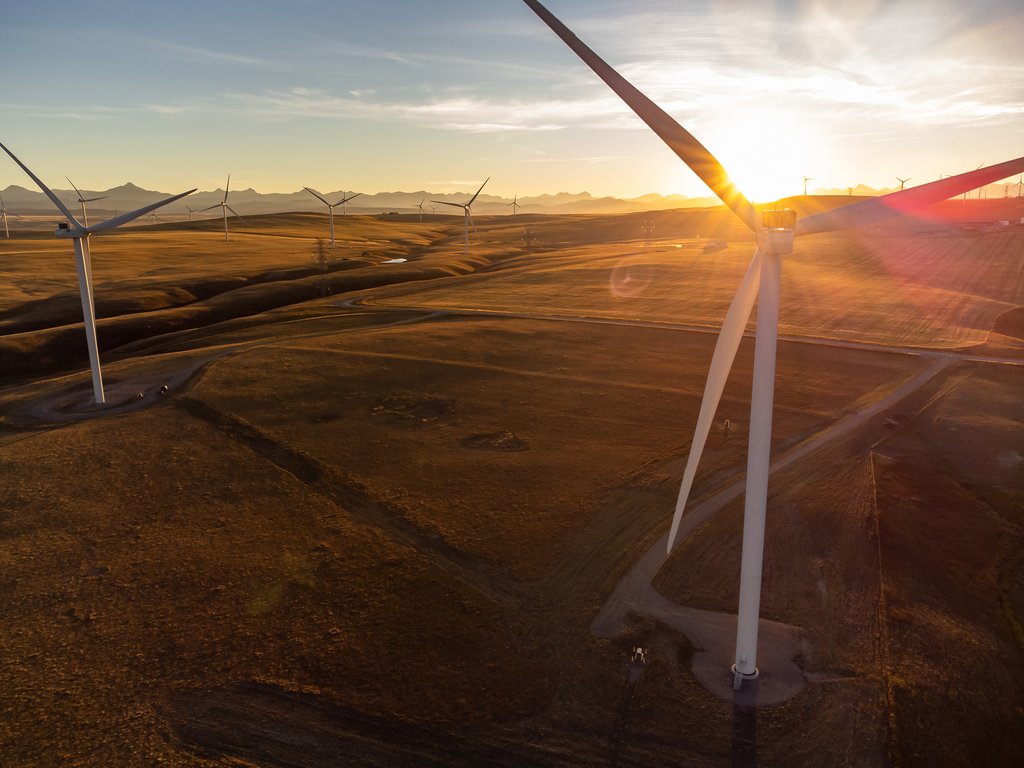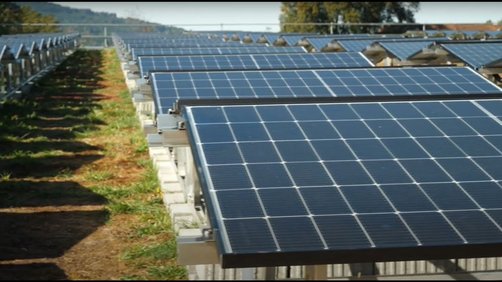Research - 12.01.2023 - 10:54
“To counter climate change, start-ups and large companies must cooperate”
In cooperation with HSG Professor Ann-Kristin Zobel and Stephen Comello from the Energy Futures Initiative and formerly Stanford University Graduate School of Business, the HSG doctoral student Lukas Falcke examined how start-ups and energy providers develop innovations in the fight against climate change. The results of his doctoral thesis show: if small and big companies pool their strengths, sustainable innovation can be accelerated.

Aerial windmills at sunset with sun rays producing sustainable energy on the Alberta prairies in Canada.
“To stop the consequences of climate change as far as is still possible, completely new solutions and industries would have to come into existence in a very short period of time. I’m interested in how this probably biggest economic change of all times can work out,” says Lukas Falcke. In his doctoral thesis at the HSG’s Institute of Management and Strategy (IfB), the 27-year-old examined how established energy suppliers and cleantech start-ups cooperate in order to develop technical solutions for the fight against climate change. “Individual firms are often overtaxed by the complexity of today’s problems. Both the quick and innovative work of smaller firms and the infrastructure of big corporations are required,” says Falcke.
A well-known example of a successful collaborative innovation was the development of the COVID-19 vaccine by Pfizer/Biontech in 2020: the pharmaceutical corporation Pfizer made available production and distribution plants for the purpose, while the comparatively small company Biontech supplied the mRNA technology. “This cooperation was the key to the speed at which the vaccine was developed and produced,” says Falcke.
Such joint and swift development of new technological solutions was made possible by the globally rapidly growing volume of data, among other things, says Falcke. “We’ve got an interesting constellation at present: on the one hand, we must decarbonise our economy exponentially – i.e. extremely quickly. On the other hand, the availability of data is also increasing at an exponential rate.” This convergence is paving the way for opportunities for rethinking collaborative innovation – both in academia and in practice.
Big corporations, too, must find new roles
For his doctoral thesis entitled Collaborative Innovation in the Context of Emerging Digital Technologies and the Fight against Climate Change, Falcke and his co-authors examined the cooperation of ten big, globally operating energy suppliers and of 57 established cleantech start-ups. Currently, the latter employ between 50 and 300 people and have a sound financial basis. Falcke interviewed a total of approx. 90 representatives of the energy suppliers and the start-ups, as well as investors and experts. Additionally, he and his co-authors observed the exchange between energy suppliers and start-ups during more than 290 hours of digital meetings and were granted access to confidential documents.
“The personal level naturally plays an important part in this type of cooperation. At the beginning, there are two cultures which clash in such negotiations,” says Falcke. But the personal relationships which evolve in the course of time are only one level of cooperation ventures that are in good working order. In addition to this, both energy suppliers and start-ups have to integrate the knowledge generated in the exchange into development and production processes. “In the longer term, this type of cooperation results in a reorientation of economic ecosystems,” says Falcke. In the energy sector, for instance, this means that the energy providers, too, must find new roles because in the energy turnaround, they will also depend on the technologies developed by start-ups. “In addition, the way in which companies and institutions in a wide variety of industries solve problems will be significantly changed through collaborative innovation.” In the future, firms will not primarily look for competencies within their own organisation but within their network.”
From the HSG to Amsterdam as professor
Falcke will obtain his HSG Doctor’s degree in spring 2023. For the public defence of his work, he made use of the digital infrastructure of the SQUARE: he set up a live link with his co-author Stephen Comello from the EFI Foundation and Stanford Graduate School of Business for the presentation; HSG professor Ann-Kristin Zobel, another co-author, and Christopher Tucci, co-supervisor of the thesis and professor at Imperial College London, were present on site in the SQUARE.
After the successful defence in July, things happened fast: Falcke was appointed assistant professor at the KIN Center for Digital Innovation at the Vrieje Universiteit Amsterdam, where he has been working since September. He teaches and conducts research on sustainable innovation and emerging technologies in the business sector, among other things.
In addition, Falcke is continuing to do research on net zero strategies together with Ann-Kristin Zobel at the HSG’s Institute of Management and Strategy (IfB). “After all, I’m dealing with interfaces between sustainability, technology and the economy. The IfB and the HSG were an ideal environment for this interdisciplinary research,” says Falcke, who prior to his doctoral studies obtained a Master’s degree in Management, Technology and Economics from ETH Zurich. Thus his supervisor, Ann-Kristin Zobel, created ideal research conditions for him, and an exchange with researchers from the HSG’s Institute for Economy and the Environment (IWÖ-HSG) and the Institute of Information Management (IWI-HSG) and of Technology Management (ITEM-HSG) at the HSG had provided inputs for his own work time and again.
More articles from the same category
This could also be of interest to you
Discover our special topics















